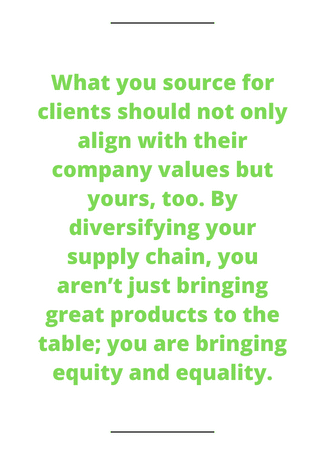(Editor’s Note: PPAI Media’s Voices series introduces the opinions, experience and advice of promo industry influencers. The opinions and ideas belong to the individual writer.)
In a world increasingly driven by transparency and responsibility, businesses have taken note of the ESG (Environmental, Social, and Governance) framework. While every pillar is essential, the ‘social’ aspect, which stands at the intersection of businesses and humanity, requires more attention now than ever.
The path is clear: Whether you’re a multinational corporation or a local startup, championing social causes can be both a moral commitment and a strategic advantage.

What We Mean By ‘Social’
At its core, the social component of ESG reflects how businesses manage relationships. This means considering the well-being of employees, ensuring ethical behavior within the supply chain, engaging positively with local communities and prioritizing the welfare of customers.
Employee relations is an integral part of this pillar. It’s about creating safe and inclusive workplaces that provide avenues for growth.
Similarly, supply chain management isn’t just about cost-effectiveness – it’s about ensuring that everyone involved is treated fairly and ethically. The same spirit extends to community engagements and ensuring customer well-being, in other words standing up for their safety, privacy and overall welfare.
Leading with purpose isn’t just something that looks good – it translates to a more robust bottom line. A 2021 survey by Porter Novelli found that 71% of respondents would purchase from a purpose-driven company over the alternative when cost and quality are equal.
A Diverse Supplier Base Is Key
I am a champion of supplier diversity, and for good reason. In 2023, the National Minority Supplier Development Council found that companies with diverse supplier bases show a 133% greater return on procurement investments than those without a supplier diversity program.
Regarding the social arm of ESG, I believe that supplier diversity is an integral, non-negotiable component. What you source for clients should not only align with their company values but yours, too. By diversifying your supply chain, you aren’t just bringing great products to the table; you are bringing equity and equality.

While many of our industry distributors have made strides in recent years toward diversifying their supply chains, much work remains. One 2023 benchmarking report concluded that 80% of all companies – not just those in promo – still conduct less than 5% of their purchases with diverse suppliers.
This can change today with all of us. After all, our industry is a $25 billion powerhouse that can enact meaningful social change. We each play an integral role in developing an inclusive, socially responsible economy by offering clients what I like to call “Good, Better, Best” options.
Suppose you ensure that the products you present are from a diverse range of suppliers with social good initiatives built into their business. In that case, chances are your clients will choose them over the less expensive options that don’t meet those important standards. A 2023 study by McKinsey found that products making ESG-related claims averaged 28%cumulative growth over the past five-year period versus 20% for products that made no such claims.
Social Good: A Universally Relevant Theme
The beauty of the social pillar of ESG is its adaptability.
Regardless of size, every business has the tools to make a difference internally and externally. When the COVID-19 pandemic emerged in 2020, we faced a decision at my company, Redwood Classics Apparel. While domestic production demand increased due to fractured supply chains, we decided to close one of our retail lines to pivot to producing medical-grade gowns for our community. We also began making three-layer cloth face masks, selling them on our website and enacting a “buy one, give one” program.
Through this program – the #MadeForGoodChallenge – we provided free masks to communities across Canada through partnerships with hospitals, community centers, shelters and more. We created a “business within a business” to fuel our philanthropic efforts. Through this program, the largest financial institution in Canada bought masks for all its staff at full retail pricing because they knew it would enable them to pay it forward and meet their social good goals.
READ MORE: Kathy Cheng: It’s OK To Not Be Perfect On ESG
When each company in a supply chain commits to social responsibility, the communities in which we live and work benefit. You don’t need a million-dollar budget to make a difference. Sometimes, supporting a local initiative or providing a platform for community voices can make a substantial impact.
The key to all of the above is that you do it with authenticity. A recent article by Forbes notes that 56% of consumers say too many brands use societal issues as a marketing ploy. That’s why you should promote and stand behind causes you genuinely believe in and care about, ones that are built into the core ethos of your business.
56% of buyers say too many brands use societal issues as a #marketing ploy to sell more of their product. #TrustWashing via @EdelmanPR https://t.co/xTnmMndCB9 pic.twitter.com/WrwqkJkxfl
— Katie Martell (@KatieMartell) September 10, 2019
With so much noise online, the best way to stand out is to be yourself – authentically and with conviction.
Implications In Branded Merchandise
The branded merchandise realm sits at an interesting juncture. It’s not just about products, but stories values and messages. Every product tells a story, and this story must align with ethical and social values.
Branded merchandise can be a powerful tool for advocacy. A well-designed promotional product can raise awareness about social causes or act as a conversation starter, making them invaluable tools in the larger ESG framework.
The social pillar of ESG is more than just a corporate responsibility; it’s a commitment to building a better future. Whether through treating employees right, ensuring ethical supply chains or using promotional products as tools for positive change, businesses of all sizes have a pivotal role in making our world a better place.
Cheng is the president of Redwood Classics Apparel (PPAI 696010, IS) and a leading industry advocate on corporate social responsibility. She earned Ascend Canada’s Woman of Distinction Award for 2022.


